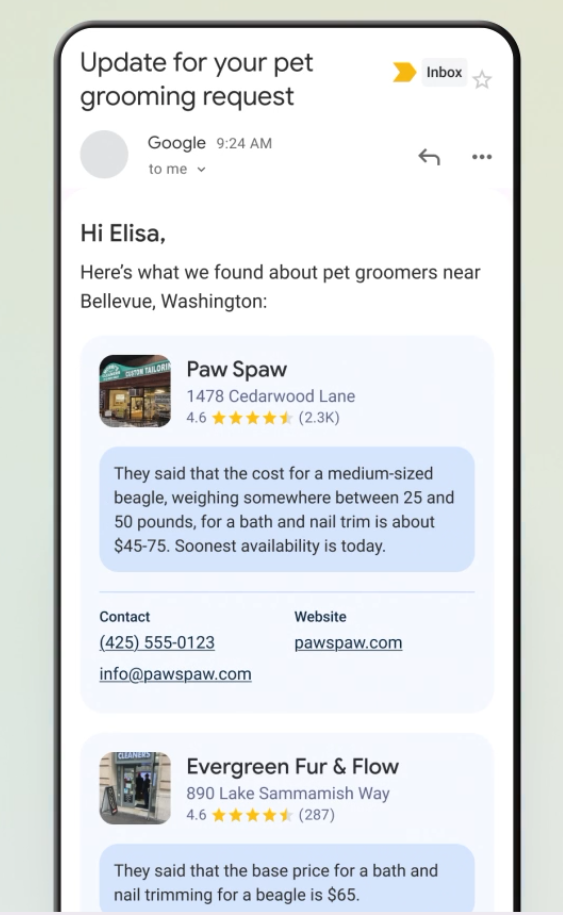Welcome to Google's new AI assistant that helps homeowners call multiple local plumbing companies to gather quotes for a specific service. This is going to be challenging for plumbing companies that, "CANNOT GIVE PRICES OVER THE PHONE".
Plumbers should be aware of this scenario: A homeowner discovers a leaking toilet on a Tuesday morning. They grab their phone and ask Google to book a plumber. After gathering details about the leak, preferred appointment times, and service requirements, Google calls your shop. The voice on the other end isn't a person but a sophisticated system confirming whether you can handle the job at the requested time. It's going to ask for a quote on a specific service before asking if your plumbing company is available at a specific time and date.
Your shop can receive these appointment requests either through an online booking partner you already use or through these direct automated calls. If you've already connected your calendar through a scheduling provider, the system works even more smoothly, like a properly vented drain line.
Beyond booking jobs, Google calls your plumbing company and a few other plumbing companies, gathers the information, and then relays it back to the customer. Google has a detailed support page where you can learn more about automated calls from Google on behalf of customers.

The system also helps confirm pricing and availability for specific services. When a homeowner asks Google how much local plumbers charge to replace a garbage disposal, Google might call several businesses in the area—including yours—to gather accurate quotes. The customer then receives an email containing this information, potentially bringing them one step closer to scheduling with your company.
Where This System Works (And Where It Doesn't)
Like varying plumbing codes across jurisdictions, Google's automated calling system doesn't operate everywhere. Currently, it functions throughout most of the United States, with FIVE EXCEPTIONS (as of July 17, 2025 - Not Available in these States):
- Indiana
- Louisiana
- Minnesota
- Montana
- Nebraska
If your plumbing business operates in one of these states, the system simply won't contact you. For everyone else, Google follows reasonable calling hours—no automated requests at 3 AM, even for emergency services. The system only reaches out when a legitimate reason exists: a customer actively seeking an appointment, someone checking your availability for emergency service, or verification of your business hours or inventory status.
Google occasionally makes separate calls or sends texts to confirm your Business Profile information, such as checking whether you've extended your hours during high-demand periods or if you stock particular parts. These verification contacts help keep your information current, similar to how regular maintenance prevents future plumbing problems.
Opting Out If You Prefer the Old-Fashioned Way
Some plumbers prefer handling all calls personally, just as some still swear by manual pipe threading over electric models. If you'd rather not participate in Google's automated system, you have options.
The simplest approach happens during the call itself. When Google's system contacts your business, you can clearly state something like, "Please remove my plumbing company from your list" or "Please stop calling my business." The system recognizes these opt-out requests and discontinues future automated calls.
You can also change settings directly in your Business Profile. If Google called specifically to map out your phone tree system (the "Press 1 for scheduling, Press 2 for billing" structure), you can opt out of those particular mapping calls by leaving a voicemail at +1-650-206-5555. Simply state your business name and phone number, and request no further phone tree mapping calls.
For plumbing businesses receiving a high volume of emergency calls, this automated system might actually streamline your operation. Rather than having your on-call technician field every inquiry about pricing or availability, Google handles the initial screening, only sending confirmed leads your way. It functions somewhat like a dedicated virtual receptionist who never takes lunch breaks or calls in sick.
Making the System Work For Your Plumbing Business
The effectiveness of these automated calls depends largely on how well you've set up your Google Business Profile. Think of your profile as the main water line feeding information to potential customers—if it's restricted or outdated, everything downstream suffers.
Accurate business hours matter tremendously. If Google believes you close at 5 PM when you actually offer emergency services until 9 PM, you might miss calls for lucrative after-hours jobs. Likewise, having clear service categories listed helps Google connect you with the right type of customer. A homeowner searching specifically for "slab leak detection" should find you immediately if that's a service you provide.
Training your front desk staff about these automated calls prevents confusion. The Google system identifies itself clearly, but the experience differs from typical customer calls. Your team should understand how to respond to these automated inquiries, providing accurate information about pricing, availability, and scheduling. Consider creating a quick reference guide for common services and their current rates, helping your team respond confidently whether it's a human or Google on the line.
For multi-location plumbing companies, these calls typically route to your primary business phone. If you operate branches across different neighborhoods or cities, make sure whoever answers the main line can access scheduling information for all locations. Otherwise, you might inadvertently turn away work simply because the person answering couldn't confirm availability at your crosstown office.
The information you provide during these calls directly influences whether customers choose your plumbing business over competitors. When Google compiles service quotes from multiple providers, being prompt and clear with your pricing might make the difference between booking the job or losing it to another company down the street.
The Connection Between Google Calls and Your Online Reputation
These automated interactions form one piece of your broader online presence. Each accurate response to a Google inquiry reinforces your reliability in the digital world, similar to how consistently good work builds word-of-mouth referrals in the physical one.
Consider the customer journey: someone notices a dripping faucet, searches online for plumbers, sees your business listing, and asks Google for information. If Google successfully confirms your availability and pricing, that customer moves one step closer to becoming a paying client. The automated system essentially pre-qualifies leads, reducing time spent on calls that might not convert.
Your responsiveness to these automated inquiries also indirectly affects your visibility in local search results. While Google doesn't explicitly rank businesses based on their participation in the automated calling program, businesses that consistently provide accurate, timely information tend to perform better overall in search rankings. It's not unlike how properly maintaining your service vehicles preserves their value—regular attention pays dividends over time.
Beyond Automated Calls: The Broader Picture
The automated calling system represents just one facet of how Google connects plumbing businesses with potential customers. Your complete Google Business Profile includes photos, reviews, service areas, and more—all working together to present your company to people with urgent plumbing needs.
Reviews particularly complement the automated calling system. A customer might receive pricing information through Google's automated process, then check your reviews before making a final decision. Positive feedback about your punctuality, fair pricing, and quality workmanship reinforces the information provided through the automated system.
The photos you upload to your profile similarly support the automated calling function. Images of your uniformed technicians, well-stocked service vehicles, and completed projects help customers visualize who might arrive at their home after booking through Google's system. This visual element adds a human connection to the otherwise automated process.
Ultimately, Google's automated calling system serves as a bridge between digital searching and physical service. It helps convert someone's online query into an actual appointment in your schedule book, smoothing the path from "I need a plumber" to "The plumber is on the way."
For plumbing businesses already stretched thin with emergency calls, maintenance appointments, and remodeling projects, this automated assistance offers valuable support without adding cost or complexity. It handles the initial customer contact while you focus on what you do best: solving water, waste, and gas problems for the people in your community.




